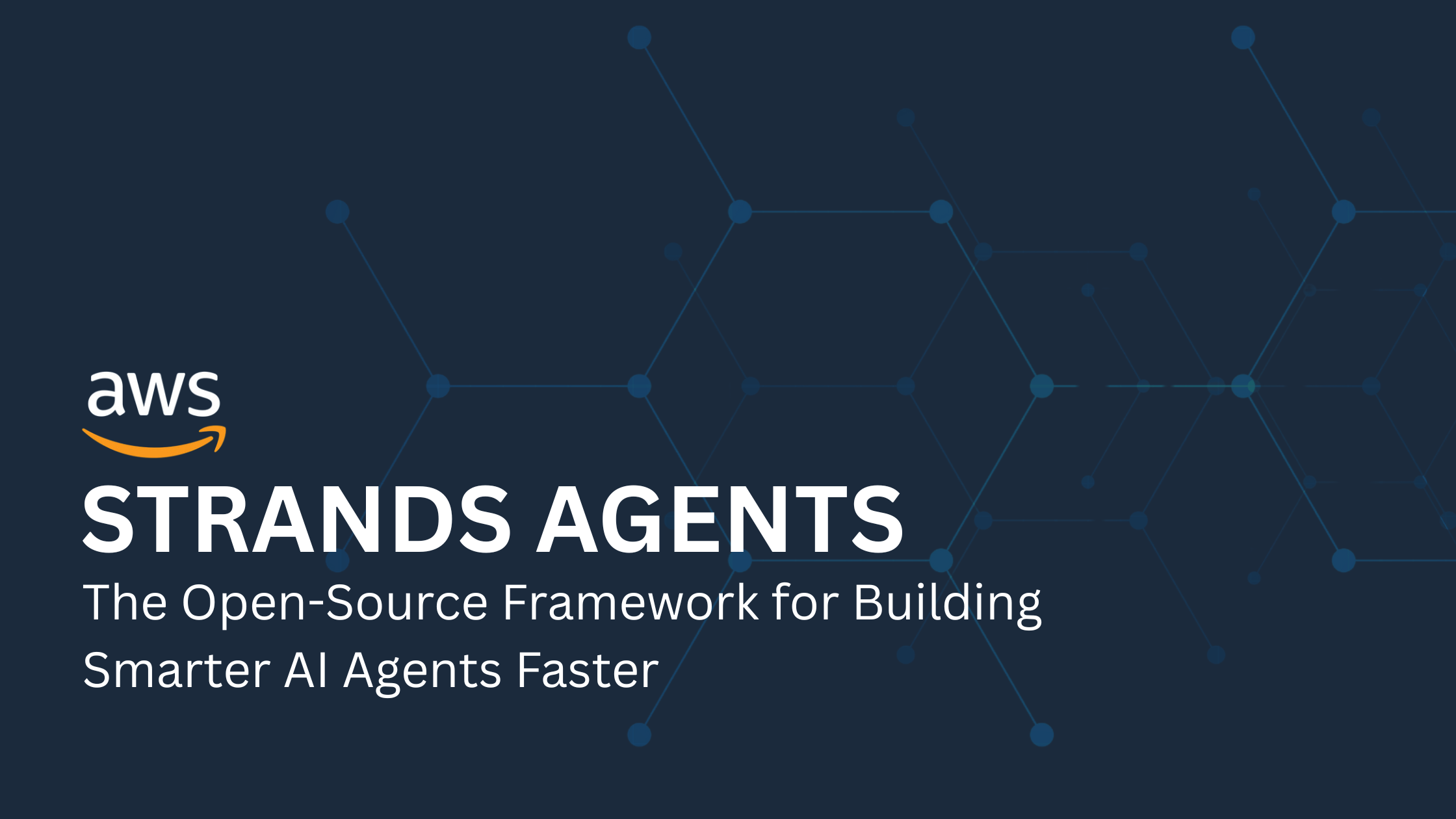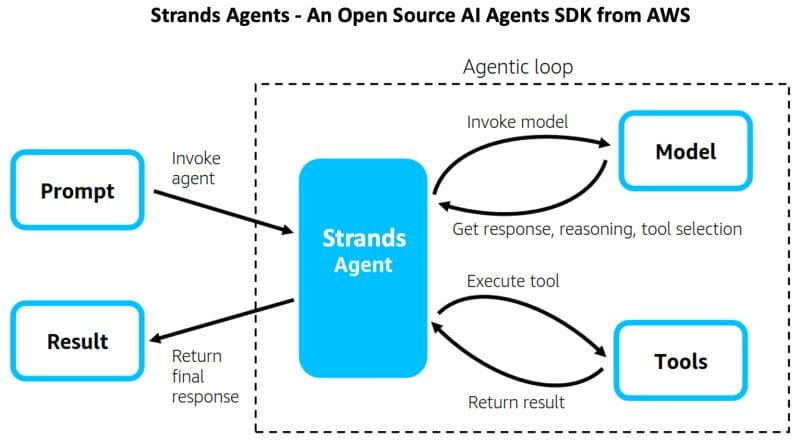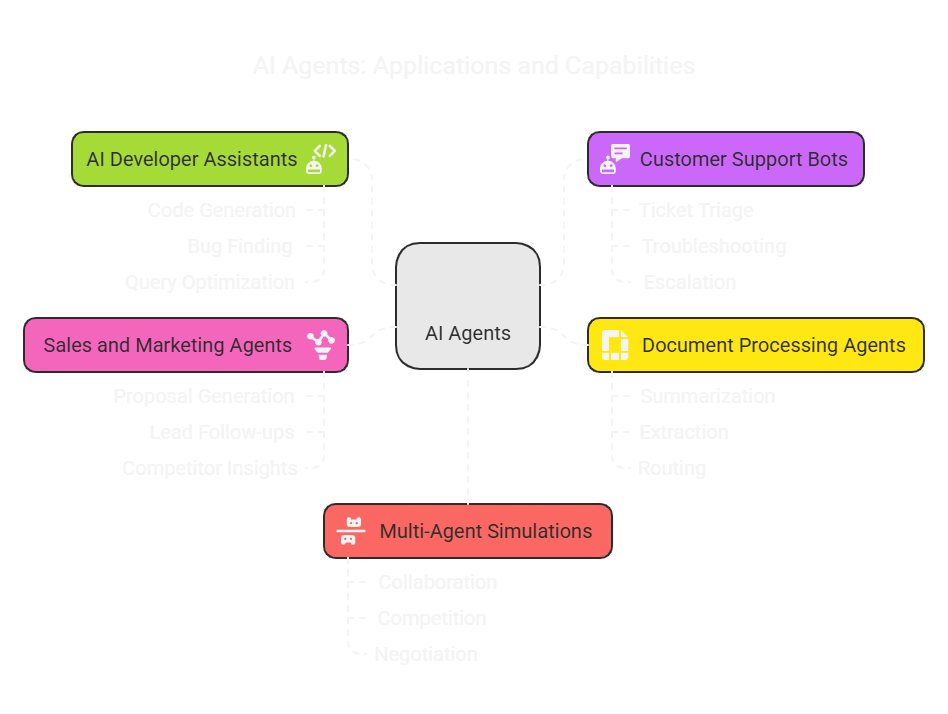AWS Strands Agents: The Open-Source SDK Transforming AI Agent Development
Build AI agents faster with an easy and flexible SDK.

AWS Strands Agents: A New Era for AI Agent Development Begins
Artificial Intelligence has evolved at a remarkable pace over the last two years, but the journey from concept to production has remained complex for many teams. While modern large language models (LLMs) are capable of impressive reasoning, tool use, and task planning, developers have still had to deal with cumbersome orchestration layers and over-engineered frameworks.
That changes today.
Amazon Web Services (AWS) has officially released Strands Agents, an open-source SDK that reimagines AI agent development with a model-driven approach. Built and battle-tested by internal AWS teams—especially those working on tools like Amazon Q Developer—Strands enables developers to build intelligent, production-grade agents in days, not months.

Why Did AWS Build Strands?
The world of LLMs has fundamentally shifted since early 2023. These models now:
- Understand context at scale
- Perform multi-step reasoning
- Call APIs or tools with precision
- Adapt to dynamic environments
In short, the intelligence that once required complex rule engines and orchestrators is now available natively in the LLMs themselves. Yet, many developers were still wrapping these models in rigid pipelines.
AWS recognized this disconnect. Instead of continuing to patch complexity on top of intelligence, they built Strands—a lightweight SDK that embraces the natural reasoning capabilities of modern LLMs and focuses on simplicity, speed, and scale.
What Makes Strands Different?
The name Strands comes from its core philosophy: connecting just two elements—a model and a set of tools, like the strands of DNA. It’s an elegant, minimalistic framework that enables a powerful question:
“What if building an AI agent was as simple as providing a prompt and a toolbox?”
And with Strands, that’s exactly what you get.
Unlike traditional frameworks that require developers to manually orchestrate tasks, Strands delegates planning and execution to the model, freeing developers to focus on outcomes, not workflows.
Key Differentiators:
- No orchestration logic required
- Built-in observability for production
- Fully model-agnostic
- Rich tooling support via Model Context Protocol (MCP)

Key Features of AWS Strands
Here’s a breakdown of what makes this SDK a game-changer:
1. Plug-and-Play Model Support
It supports a broad range of large language models (LLMs), including:
- Amazon Bedrock
- Anthropic’s Claude
- Ollama
- Any other LLM via the LiteLLM interface
This flexibility allows you to experiment, optimize, and scale across providers, whether you’re using open models or proprietary services.
2. Rich Ecosystem of Tools
Strands comes with 20+ pre-built tools, and it supports thousands more through the Model Context Protocol (MCP). You can easily integrate:
- Search APIs
- File readers
- Function calling
- External databases
- Workflow connectors
This empowers you to create intelligent agents that not only comprehend natural language but also perform meaningful real-world tasks.
3. Built-in Observability
AI agents in production need more than intelligence—they need reliability. Strands offers:
- OpenTelemetry integration
- Tracing, logs, and metrics
- Error handling hooks
This makes debugging and monitoring seamless, especially in cloud-native environments where performance and uptime matter.
4. Developer-First UX
Getting started with Strands is ridiculously easy. You don’t need a PhD or a 1000-line configuration file. Here’s a sneak peek:
from strands.agent import Agent
agent = Agent(
model="bedrock: anthropic.claude-v2",
tools=[my_toolkit],
prompt="Help me summarize this document and create follow-up tasks."
)
response = agent.run()
It’s Pythonic, modular, and designed to get you building fast.
5. Deployment-Ready for Any Use Case
Strands supports flexible deployment patterns, including:
- Local dev environments
- AWS Lambda functions
- Dockerized containers on ECS/EKS
- Hybrid or edge use cases
No matter your infrastructure stack, Strands is ready to scale with you.
Real Industry Momentum
AWS isn’t building this in isolation. Some of the biggest names in the tech and consulting world are already supporting and contributing to Strands:
- Accenture
- Anthropic
- Meta
- PwC
That kind of early adoption is a strong signal. Strands is not just a developer toy—it’s a foundational tool for the next generation of AI-native applications.
Use Cases for Strands Agents
Wondering where Strands can fit into your workflow? The possibilities are enormous.
1. AI Developer Assistants
Build intelligent coding copilots that help you generate code, find bugs, and optimize queries—like Amazon Q Developer.
2. Customer Support Bots
Deploy agents that can triage tickets, offer troubleshooting, and escalate when necessary.
3. Document Processing Agents
Summarize, extract, and route documents like invoices, contracts, or compliance reports automatically.
4. Sales and Marketing Agents
Create agents that auto-generate proposals, handle lead follow-ups, or provide competitor insights.
5. Multi-Agent Simulations
Run simulations where agents collaborate, compete, or negotiate—ideal for training, research, or game environments.
Whether you're building simple assistants or multi-agent systems, Strands provides a reliable and extensible foundation.

How to Get Started
Explore the GitHub Repository
Visit the official repo: https://github.com/aws/strands
You’ll find examples, documentation, templates, and community updates.
Install the SDK
pip install strandsRead the Docs and Tutorials
Check out the Quickstart Guide and sample projects to get up and running in no time.
What’s Next?
Clare Liguori and her team have hinted that another exciting update is coming next week, so it’s clear AWS is just getting started with Strands.
We anticipate new features like:
- Multi-agent orchestration patterns
- Custom tool builders
- Expanded support for fine-tuned models
- More real-world templates for finance, healthcare, and more
Final Thoughts: AI Agent Development, Reinvented
The release of Strands is more than just another tool—it’s a paradigm shift in how developers think about AI agents.
With the power of modern LLMs, there’s no reason to cling to brittle, hard-coded pipelines. Instead, we can build agents that are modular, intelligent, and production-grade, without the months of engineering effort traditionally required.
Strands gives every developer—from startups to Fortune 500 teams—the ability to build truly useful AI agents faster, simpler, and more reliably than ever before.

FAQs
1. What is AWS Strands Agents, and why was it created?
Strands Agents is an open-source SDK from AWS that streamlines AI agent development by removing the need for complex orchestration. It leverages the natural reasoning power of modern LLMs to help developers build production-ready agents faster and with less effort. It’s built on a model-driven approach that’s fast, flexible, and easy to deploy.
2. What makes Strands different from traditional AI agent frameworks?
Unlike conventional frameworks that rely on heavy orchestration, Strands delegates planning and task execution to the model itself, allowing developers to focus on outcomes instead of rigid workflows. It’s:
Model-agnostic
Orchestration-free
Built for observability
Rich in tool support through Model Context Protocol (MCP)
3. Which language models and tools does Strands support?
Strands supports a wide range of LLMs, including:
Amazon Bedrock
Anthropic’s Claude
Ollama
Any model compatible with LiteLLM
It also includes 20+ built-in tools and supports thousands more via MCP, allowing integration with APIs, databases, file readers, and more.
4. How production-ready is Strands?
Strands is built with observability and deployment in mind. It includes:
OpenTelemetry for tracing and metrics
Error handling hooks
Support for AWS Lambda, ECS, EKS, and hybrid environments
This ensures agents can be deployed and monitored reliably in real-world applications.
5. How do I get started with Strands Agents?
You can start in three simple steps:
Visit the GitHub repository: github.com/aws/strands
Install the SDK using pip install strands
Follow the quickstart guide and examples to build your first agent using just a prompt and a toolkit

